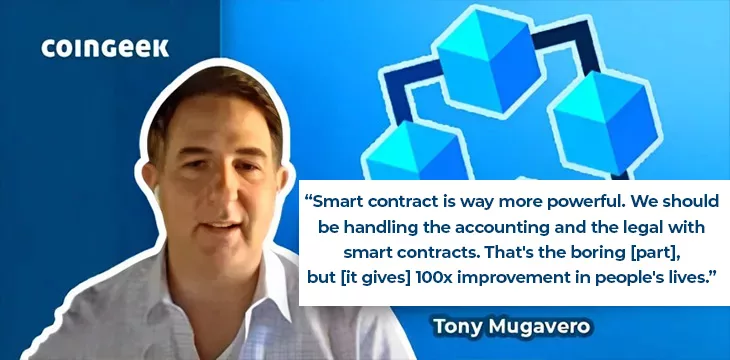|
Getting your Trinity Audio player ready...
|
After recovering from an illness, Kurt Wuckert Jr. was back to host the CoinGeek Weekly Livestream this week. Joining him was Tony Mugavero from Rad NFTV. The discussion was about the future of streaming and how blockchain technology will play a role.
What is Rad NFTV up to?
Mugavero kicks things off by announcing that Rad is ready to launch a creators portal for video content. This will have revenue splits via smart contracts, revolutionizing how creators get paid. The Rad team wants to empower creators, make blockchain useful, and usher in a new model, he says.
Wuckert points out that Rad isn’t a blockchain startup—it’s been around for a while as a media company before it got interested in blockchain. He asks what interested them in the technology.
Mugavero explains that, traditionally, media companies have been run on paper. This involves potentially hundreds of contracts, all with unique terms, dates, revenue splits, and other details. Managing these is a major headache and requires lots of administration and manpower.
Rad initially incentivized people to engage with its media by dropping tokens, but it quickly realized that streamlining all of this administrative burden by utilizing a scalable blockchain would be a real gamer changer.
Mugavero says it will be “Web 2.5” for the next decade or so. There are stepping stones along the journey to Web 3.0.
How does the content side of streaming services work?
Wuckert highlights how there are now dozens of streaming services, and content comes and goes on them. He wonders how many are profitable and asks Mugavero for the lowdown on how the content side of things works.
Mugavero says big services like Netflix (NASDAQ: NFLX), Amazon (NASDAQ: AMZN), and others pay billions per year for access to content. Rival streaming services can not compete as they have to either differentiate by finding a niche or by producing and distributing their own content. Rad wants to offer underserved content, and as Mugavero later points out, it’ll be content with an edgy, ‘rad’ feel. “There’s a lens on the content,” he says.
Wuckert rightly says there are many indie producers these days with huge audiences. He points to Joe Rogan and Mr. Beast as two examples. Mugavero says that the big platforms these creators exist on start out with friendly terms and then slowly squeeze content creators. Sometimes, they have to wait months to get paid anything.
Can I watch the Super Bowl on Rad but only pay for the game and not the buildup?
Mugavero says it’s the dream, but only a few companies worldwide can even dream of offering the Super Bowl or Olympics. However, offering content from indie sports and smaller sports may be possible.
Is this a new way to finance movies via a reliable earn model? Could it work to get casts and crews to join a project?
Marc Heijdeman asks this question. Mugavero answers that there are some legal questions around funding this way. As we’ve seen, many questions crop up around securities when tokens are issued. However, he says some regulated crowdfunding platforms accept digital currencies and issue tokens in this way.
What does Rad NFTV look like behind the scenes?
Mugavero says that, like so many others, they started on Ethereum but quickly realized it wouldn’t work. Building the underlying infrastructure that will host the new platform took time.
At first, it was very NFT-centric, but doing things this way wouldn’t work as audiences would be too small. They can still gate access to some content by utilizing NFTs, but it’s now based around open edition tokens with some limited edition ones, too.
After lots of testing, Mugavero says it’s now go time. It will be possible for creators to upload and self-manage content on RAD once the platform is released within days of this interview.
Could Rad have exclusive content in 10 years?
Mugavero answers that, right now, it’s not exclusive. The innovation is that it’s being bought and sold in a new way.
Rad’s pitch to creators is to self-publish and get paid more, quicker. It should particularly appeal to creators with an interest in blockchain technology.
Wrapping up, Mugavero underscores that the mass market doesn’t care about blockchains. They want an easy, user-friendly experience whereby they can enter their credit card and watch a movie on date night. Everything we build going forward should have that in mind.
To hear more about the new Rad NFTV platform, reviving old content that can no longer be easily found, and much more, watch the CoinGeek Weekly Livestream now!
Watch: NFTV unites entertainment and blockchain

 02-15-2026
02-15-2026 




